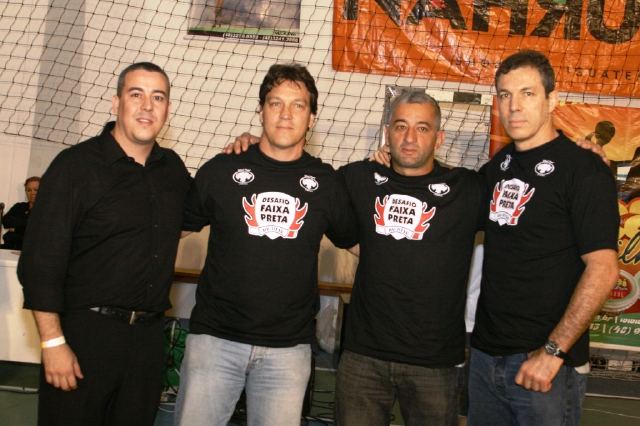
Stalwart grapplers and old chums Marcus Bochecha and Antônio “Cara de Sapato” in the Pan 2012 final that would not be: a friendly embrace determined the absolute gold medalist / Photo: Ivan Trindade/GRACIEMAG.com.
While hundred-year-old sport soccer’s big debate these days is ethics, rules and regulations, why should Jiu-Jitsu’s be any different? On the mat, controversy likes sporting a gi when the subject comes to closing out final; that is, a gentlemen’s agreement between two teammates who reach the final together, where the only move the crowd gets to see is an embrace. If you’re a GRACIEMAG.com reader, you’ve seen this subject come up before. But could a creative solution bring the issue to resolution? One Jiu-Jitsu professor thinks so.
Claudio Arrais, a black belt and the organizer of the South American Jiu-Jitsu Championship, went through a peculiar situation late last year. He explains: “There was a championship in Santa Catarina where four athletes from the same team closed out the semifinals. The worst part is that the city mayor was there to award the prize to the absolute champion. So I had to go to great lengths to get him to understand that in Jiu-Jitsu this is acceptable. Politely but in jest, he said the most significant division of a championship could not go without a final, and he offered to do the final against any one of the four,” Arrais recollects.
BAD FOR JIU-JITSU FANS, AWFUL FOR TV
Having experienced the issue in the flesh, and aware that it’s unpleasant to face a friend or brother, Claudio drummed up a simple solution for the dilemma.
“I understand that it’s a really delicate situation, and it’s one that we should always respect. On the other hand, also out of respect, we can’t leave the championship, fans and TV broadcasters without the matches that determine the titles. This practice of closing out brackets arose in Jiu-Jitsu at a time when there was no such thing as the internet, and information regarding techniques was kept under military-like secrecy, which isn’t the case these days, with all the seminars, DVDs, video classes and YouTube,” Claudinho says in providing background.
“I suggest the following: The champion and runner-up who closed out the brackets receive their medals normally; after all, they made it there fair and square through lots of dedication, training and fair play. However, their points shouldn’t count for the overall team score. This measure would protect the fans and the promoters of the championship, and it would also get the athletes to think less about themselves and more about their team,” says the Rilion Gracie black belt.
(Watch JT and his teammate Jimmy Harbison going at it for real in the absolute final at the 2012 Houston Open:)
To Arrais, such a penalty could start changing the outlook and help move Jiu-Jitsu forward, not backwards.
“WITHOUT FINALS THERE NO MEDIA, NO SPONSORS”
“Choosing to close out finals is extremely damaging to Jiu-Jitsu. The championship loses out on showcasing a final. The crowd loses out by not getting to watch the grand decider. The media (read TV) is stuck questioning whether it’s worth covering a championship that might not result in a final match. No media, no big sponsors. So it’s unfair that the team that allows such a thing to happen should go without being penalized for its stance, having produced the athletes. I agree that everyone should have the right to decide what’s best for their team, so long as it’s not to the detriment of Jiu-Jitsu as a whole,” asserts Claudinho, who has his own academy, in the city of Florianópolis.
The teacher isn’t naïve to the point of thinking that that will settle everything. But he does take kindly to such a change in mentality, even if it results in teammates rolling symbolically in the finals.
“Sure, new ways of avoiding teammates doing finals will crop up. Some will feign injury, others will refuse to compete, still others will just rig the match, do an exhibition. Should there be suspicions that the athlete is faking an injury, the staff doctor giving a verdict could be a solution, but even an exhibition match would be better than the ref simply raising the arm of the winner, to everyone’s frustration. In a nutshell, it would all be for the development of Jiu-Jitsu, a sport that educates us and fills us with pride for being a part of it, and for the athletes, teachers, promoters and team owners,” Claudio says in conclusion.
What do you say, gentle reader: can this be the way forward? Join the debate floor by commenting below.

The promoter in good company: André Santos, Crolin Gracie, Claudio and Carlinhos Gracie / Publicity photo
